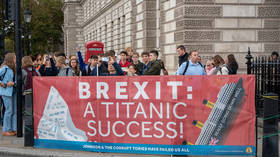‘TTIP will only be to the benefit of industries’

Most of the working groups involved in trade negotiations are represented by industries and such biased approaches raise concerns over access and the transparency of the whole process, Michael Shank from Friends Committee on National Legislation told RT.
“If you want to be a part of the trade negotiations with Europe or with the Pacific, you should have security clearance, not anyone can participate. One example of this, in the US of the roughly 30 working groups that are involved in the trade negotiations 90 percent are composed of industry, private sector. Roughly nine percent are given to civil societies, that is trade, labor, any non-profit community, environmental, health. So it is already biased towards the industry because non-profits are not allowed into the conversation,” Shank said.
Consequently, as Shank highlights, the trade agreement will not be for the benefit of the majority of the public.
At the same time, there are many more issues to be concerned about. While both the EU and the US are looking for new ways to create jobs, stimulate the economy, and improve economic productivity, the TTIP (Trans-Atlantic Trade and Investment Agreement) is likely to undermine the system.
“While it’s good for investors, it’s bad for health, for the environment, it's bad for labor and it's bad for regulations that countries and states had worked for decades to institute. So those are some of the biggest concerns, while there might be a new cash flow infusion in the tens of billions, the undermining it does to state and nation law through the investor-state tribunals, but also through controversies on the bottom regulations is what is most problematic and will cost the economies in the long run,” Michael Shank said.
As regards health, it is all about the GMO products banned in the EU but flourishing in the US, with the TTIP deal pushing GMO food into Europe. On labor regulations there is a divergence between the US and EU policy. Indeed, whereas Germany seeks to ameliorate the working conditions through improving the minimum wage, the US takes decision to cut it. In case of environment, some of the states, for example, Ecuador, were sued because they tried to protect their environment.
“When the investor state disputes some of the mechanisms that were in place, countries that are trying to protect their environment whether it is Peru, Ecuador and Canada, were sued by corporations and in 70 percent of the investor-state tribunal cases corporations won,” Shank explains.
Another problem related to environment is closely linked with energy, which is also a big part of the talks. Michael Shank argues that TTIP would help American corporations to champion export “for dirty oil and gas” to the EU.
“The US is very keen to export crude oil and fracked gas because we are looking for new markets which has already undermined the EU’s climate commitments, they wanted very aggressively to reduce greenhouse gases before 2020, but their imports of the US fracked gas are ultimately undermining that,” he said.
On the whole, Michael Shank describes TTIP and TTP agreements as a message to China, Russia and the rest of the world that they do not make part of those exclusive deals.
“We don’t have many barriers between the US and the EU already, so when we are doing TTIP it’s not really about removing trade barriers because the tariffs are quite low, it’s about saying to the rest of the world “We are of this partnership, it’s exclusive and you are not going to be a part of this,” he said.
Shank supposes that the world will soon see the emergence of other alliances and allegiances against the TTIP and TPP trend, for example, formed by Russia, China and others.
The statements, views and opinions expressed in this column are solely those of the author and do not necessarily represent those of RT.
The statements, views and opinions expressed in this column are solely those of the author and do not necessarily represent those of RT.












